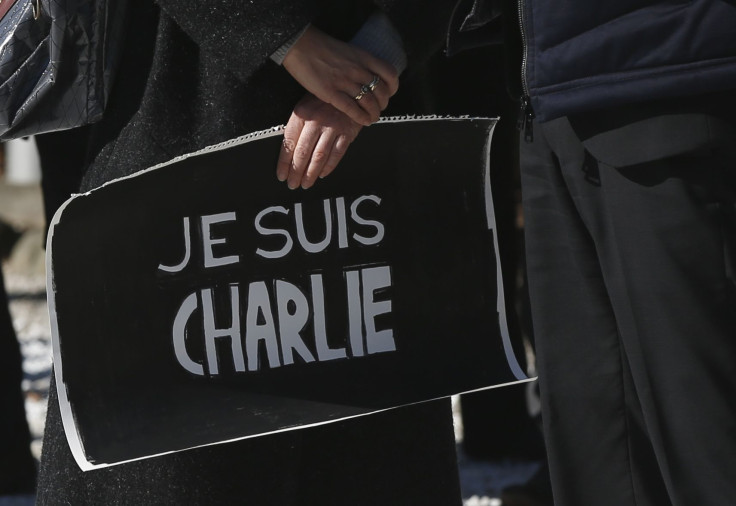In Wake Of Charlie Hebdo Attack, Marine Le Pen's Call For The Death Penalty Threatens To Further Polarize France

A day after extremists carried out the deadliest terror attack France has seen in decades, the leader of the largest right-wing party, often criticized for her anti-Muslim views, said she may reinstate France’s death penalty if she were in power. Her statement exposes how the reaction after the Charlie Hebdo massacre on Wednesday might plunge France deeper into the vicious cycle of backlash, resentment and retaliation that is giving rise to Islamophobia, experts said.
“I personally believe that the death penalty should exist in our legal arsenal,” the Front National’s (FN) Marine Le Pen told television channel France 2. If elected president in 2017, she would hold a referendum on capital punishment, which was abolished in France in 1981. A Le Pen presidency isn't an impossibly long shot; the party got one vote in four in the 2014 election for the European Parliament.
The statement came at a crucial point for the country, and for Europe, after the killing of 12 cartoonists, journalists and policemen by Muslim extremists enraged by the satirical weekly's cartoons depicting the Prophet Muhammad. "If communication and the way the governments in Europe respond to this doesn’t rely on wisdom and proper analysis then the potential for this leading to very strong societal polarizing impact is real, and that worries me," said Peter Knoope, an associate fellow at International Center for Counter-Terrorism, an independent think tank in The Hague. "Because that is what ISIS, al Qaeda and others want. This may very well have that impact."
The attack shocked the international community, inspiring both messages of solidarity with the victims and social media campaigns to combat Islamophobia. Twitter users in France used the hashtag #VoyageAvecMoi (Ride With Me), offering to accompany any Muslim feeling unsafe on public transportation.
However, France was divided even in the use of hashtags. After #JeSuisCharlie was created to offer solidarity with the victims, killed for insulting the Prophet Muhammad, the hashtag #JeSuisAhmed (I Am Ahmed) was born. The Twitter campaign was created to honor slain police officer Ahmed Merabet. Merabet was a Muslim but not a terrorist, a distinction French Muslims felt they had to make.
Some have already begun to blur the distinction between Islam and extremism. Several mosques in France were attacked Wednesday following the Charlie Hebdo shooting.
The situation could make for favorable polling numbers for Le Pen. While French Interior Minister Bernard Cazeneuve urged the nation to remain “cool headed” and “united” in the face of the tragedy, Le Pen’s party reiterated its condemnation of radical Islam just hours before she called for the reinstatement of the death penalty.
According to Euro-Islam, a research network sponsored by GSRL Paris/CNRS France and Harvard University, a statement from one of Le Pen’s advisers said, “In mosques, the sermons must be in French. The associations much be monitored with vigilance, and any serious suspicion must bring about their dissolution. Funding must be strictly controlled. In addition, encouragement and most of all participation in jihad must be severely punished, and those with dual citizenship must automatically lose their French citizenship.”
The political establishment which the FN says it is fighting has offered encouragements to national unity and to the refusal of violence in response, but voters are moving away from it.
Terrorists "hope that the anger and indignation that has swept the nation will lead some to a rejection and hostility with regards to all the muslims of France,” Robert Badinter, the Socialist who as minister of Justice oversaw the abolition of the death penalty, said after Wednesday’s attack. “This is how they will open the gap between muslims and other citizens that they dream of. Igniting hatred within the French. Let us refuse what would become their victory.”
But faced with what they perceive as a rising threat from Islam, France’s voters are already experiencing “a real turn to the right” that had Le Pen in a “position of power” even before the shooting, according to a September 2014 poll from research institute IFOP. That poll found that Le Pen would win the 2017 election by 54 percent of the vote if she ran against current French President François Hollande.
“Le Pen has done an excellent job of removing the stigma attached to her party,” Dr Emmanuel Martin, an economist and director of the Paris-based think tank Institute for Economic Studies Europe, told Newsweek in November. The FN, he said, is “simultaneously protectionist and paternalistic -- offering exactly the kind of policies people look for in times of crisis.”
© Copyright IBTimes 2025. All rights reserved.






















